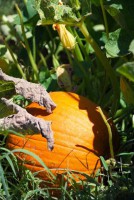Early Pumpkin Ripening

Ideally, pumpkins should be harvested when fully mature, with a deep orange color and hardened rind. However, as long as pumpkins have started to turn color, they will ripen off the vine if held under the proper conditions. While not ideal, this may be preferable to leaving them in the field if conditions are not favorable.
If necessary, pumpkins can be ripened in a well-ventilated barn or greenhouse. The best temperatures for ripening are 80-85 degrees Fahrenheit with a relative humidity of 80-85%. Night temperatures should not drop below the sixties. Even if pumpkins are ripe, a period of curing can improve storage life. The curing period should be about 10 days. During this process, the fruit skin hardens, wounds heal and immature fruit ripens all of which prolongs the storage life. Pumpkins should be stored in a cool, dry place. Ideal temperatures are between 50 F and 60 F and relative humidity of 50 - 70%. Higher humidity allows condensation on the fruit with risk of disease, and lower humidity can cause dehydration. Higher temperatures increase respiration and can cause weight loss. Temperatures lower than 50 F cause chilling injury. In a greenhouse, temperature can be managed with ventilation on sunny days. Unless it is quite cool, heat is not likely to be needed if the house is closed up at night.
Often it is not feasible to harvest pumpkins early and store them until they can be marketed, and so they must be stored in the field. If vines and fruit are healthy, storage in the field can be successful for a few weeks. If the vines die back, damage to the fruit from sun, disease and insects is more likely. In any case, it is important to scout for insects feeding on the fruit and handles, which may include squash bug nymphs or adults, or striped cucumber beetle. Control them if damage is evident. In fields that have a history of Phytophthora blight, Fusarium fruit rot, or black rot, field storage may increase the incidence of these problems, particularly if we have a period of wet weather or a major storm while fruit is sitting in the field. This has been one of the causes of significant losses in recent years, and one reason that we recommend bringing fruit in as soon as it is mature.

Upcoming Events
Eden Area Winter Vegetable Meeting
February 4, 2026
North Collins, NY
Join us for a mix of industry updates, crop protection talks, pesticide safety programming, and fertility management discussions. This meeting is jointly hosted by the Cornell Vegetable Program and Timac Laing-Gro.
1.25 DEC credits available in CORE plus 1.75 in 1a and 23.
Orleans Regional Winter Vegetable Meeting
February 9, 2026
Albion, NY
Topics include: Breeding and evaluating tomatoes to control disease and improve yield, jar testing and ensuring spray water quality, breaking down organic matter, FSMA updates and Q&A with Ag & Markets, and industry updates. Includes hands-on learning, coffee break, and sponsor booths.
DEC credits available: 1.0 in CORE plus 0.5 in 1a, 10 or 23
African Eggplant Participatory Breeding Kick-Off
March 5, 2026
Join us to learn about the Cornell African Eggplant Research Project and learn how you can participate! African eggplant, also known as Bitterball, Garden Egg, Kittley and other names, is an important crop for many members of our community with heritage from regions such as sub-Saharan Africa, Southeast Asia, and Brazil. Since 2024, the Cornell African Eggplant Research Project has been collaborating with growers and community partners across New York to develop high-quality varieties adapted to the Northeast U.S. In this meeting, we will share information about growing and preparing African eggplant, highlight our research to date, and invite partners to collaborate with us in our 2026 participatory breeding and variety selection efforts.
COST: FREE! You must pre-register to receive the Zoom link.


































